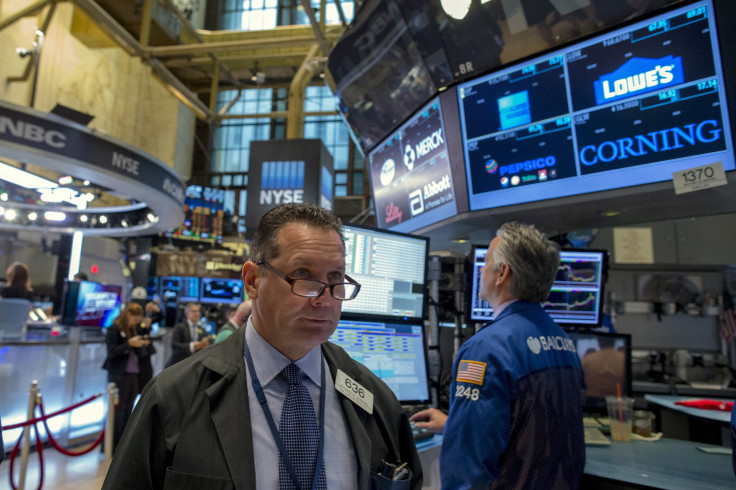Dow Jones Industrial Average, S&P 500 Eke Out Gains; Nasdaq Composite Ends Lower After Biotech Rally Loses Steam

U.S. stocks closed mildly higher Tuesday, seesawing during most of the trading session as investors continued weighed a looming government shutdown and uncertainties surrounding the health of the global economy. After opening mildly higher, the Dow fell as much as 60 points in morning trading, only to reverse and trade roughly 100 points higher. However, U.S. stocks pared gains in afternoon trading to close slightly higher a day after the Dow Jones Industrial Average plunged 300 points.
Market professionals look ahead to speeches from top Federal Reserve officials this week, which could provide more clues as to the timing of the central bank’s inevitable rate hike.
The Dow Jones Industrial Average ( INDEXDJX:.DJI ) gained 47 points, or 0.3 percent, to close at 16,049. The Standard & Poor's 500 index ( INDEXSP:.INX ) added edged up 2.31 points, or 0.12 percent, to finish at 1,884. However, the Nasdaq composite ( INDEXNASDAQ:.IXIC ) lost 26.65 points, or 0.6 percent, to end at 4,517.32.
A rally in biotech stocks fizzled in afternoon trading, sending the Nasdaq lower as the iShares Nasdaq biotechnology ETF lost roughly 0.5 percent, adding to losses after the ETF sank more than 5 percent a day earlier.
Seven of the 10 S&P 500 sectors closed higher, led by a roughly 1 percent gain in healthcare stocks following a recent bout of volatility, while tech stocks lost 0.5 percent. Dow components Apple Inc. (NASDAQ:AAPL) and Nike Inc. (NYSE:NKE) led the index lower, shedding roughly 3 percent and 2 percent, respectively.
West Texas Intermediate crude, the benchmark for U.S. oil prices, rose 2.6 percent to $45.60 per barrel for November delivery on the New York Mercantile Exchange. On the London ICE Futures Exchange, Brent crude, the global benchmark for oil prices, added 2.4 percent to $48.49 a barrel.
Investors are eyeing a speech by Janet Yellen Wednesday at the St. Louis Fed community banking conference after the fed chair said last week she expects the central bank to lift rates sometime this year.
William Dudley, president and CEO of the Federal Reserve Bank of New York, echoed Yellen’s sentiments Monday and agreed the central bank will likely hike rates later this year. However, Charles Evans, president and CEO of the Federal Reserve Bank of Chicago, said the Fed should delay a liftoff until next year.
Data released Tuesday revealed U.S. home prices rose 5 percent in July, the S&P/Case-Shiller's 20-City Index showed. The report comes in nearly in line with Wall Street estimates for an increase of 5.1 percent.
An interest rate increase by the Federal Reserve, now expected in December by many analysts, is not likely to derail the strong housing performance, says David M. Blitzer, managing director and chairman of the Index Committee at S&P Dow Jones Indices. “Prices of existing homes and housing overall are seeing strong growth and contributing to recent solid growth for the economy,” Blitzer said in the report.
Separately, U.S. consumer confidence rose moderately in September following August’s sharp rebound. The Conference Board's Consumer Confidence Index edged up to 103 in September from a revised 101.3 in August.
While consumers view current economic conditions more favorably, they do not foresee growth accelerating in the months ahead, said Lynn Franco, director of economic indicators at the Conference Board. “Consumers’ expectations for the short-term outlook, however, remained relatively flat, although there was a modest improvement in income expectations,” Franco said in the report.
Global shares traded mixed Monday after a sell-off in commodities overnight, with China’s benchmark Shanghai Composite index closing down 4 percent while Japan’s Nikkei index lost nearly 3 percent. European stocks traded lower, with Germany's DAX closing down 0.4 percent while France's CAC lost 0.3 percent.
© Copyright IBTimes 2024. All rights reserved.






















